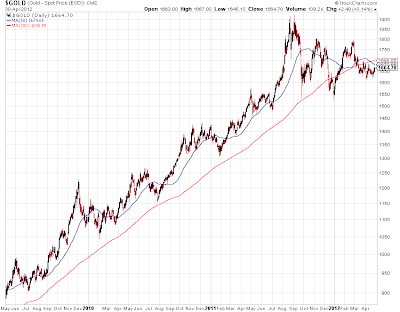I read someone's opinion, somewhere, that the surpluses of the net-producers comes from the printed money. I thought this was quite a moderately interesting idea to ponder for a few minutes.
After a little reflection, I decided this is putting the cart before the horse. With Central Banks all today looking, at least to some extent, at achieving stability in the purchasing power of their currency in terms of real goods (inflation targeting), that means not only are they vigilant and reactive to inflationary signs … but they are equally attentive to any deflationary signs.
Net-producers extracting currency from the flow to hoard as savings increases the tightness in the flow of the currency, which will naturally lead to deflation in goods prices if it remains unchecked. But, of course, in today's world it doesn't remain unchecked for long - because more supply will quickly be Quantitatively Eased into the currency flow in order to prevent any perception of illiquidity building up.
Hence my opinion is the opposite: the money is printed as a result of the tightness in the market for the currency, which to some extent is attributable to the net-producers having hoarded the currency.
If/when the surplus producers in swelling numbers may choose to no longer suck up liquidity from the currency flow and hoard it as their savings, instead choosing some other asset in exchange for their surplus incoming currency, the need for printing to counteract the effect of surplus-saving currency off-take will abate.
Traditionally, that is to say for the last few decades, the Central Banks of surplus-producing nations have chosen to send their surplus incoming currency back where it came from, in return for a Treasury bond that will see them receive their promised currency later, with a few friends tacked on for their patience in waiting. In the course of this arrangement, the trade deficit nations have avoided a need to either [a] issue more currency to keep their own local currency flow liquid, preventing prices from dropping and potentially bringing about a deflationary death spiral like the 1930's, or [b] watch as the surplus nations use their currency to bid against them for goods and services on the world markets, which would result in higher prices for those goods and services. You'll note that avoidance of [a] has no longer been the case, since 2008 when the QE programs started rolling out.
I say 'traditionally', because the indications seem to suggest that this arrangement between the Central Banks of deficit and surplus countries (which is often referred to as 'structural support' within Freegold discussions) appears to have broken down. Quantitative Easing by the major Western Central Banks is an indication that the currency flow is tight within those zones, which is depressing prices for goods & services and that in turn is threatening to precipitate the aforementioned 30's-style deflationary spiral. The flow is tight because those with savings are, in aggregate, choosing to hold onto the currency rather than spending it into the flow of commerce as they more normally might, or alternatively swapping the currency with the Treasury for a bond asset so that the Treasury can re-spend that currency and worry about how to repay the bonded loan later when it matures. The velocity of the currency through the economy is reducing, and this is being counteracted by the Central Banks injecting more currency into the flow.
In my opinion, the problem arises when the holders of these currencies, in aggregate, realise that none of the Central Banks are simply going to sit idly by and allow deflation to take hold. So why would these savers continue to hoard against the false expectation of lower prices later? At this point, there will be a greater supply of currency in the system ("M") as a result of all the QE activities, and it will begin to flow again at a higher velocity ("V") through the economy as people cease hoarding.
If M and V both grow, and we assume economic activity has by then continued to shrink (Q is smaller), which feels to me to be a more than realistic expectation. This only leaves one place that will at that point in time be undetermined: P(rices).
Bigger M times Bigger V, with smaller Q … can only result in larger P(rices). There is nowhere else in the equation for the markets to rectify the imbalance, only P is at that moment in time a variable that is up for discussion between market participants.
As prices commence a quick ratchet higher, as more and more people dishoard their saved currency… who will be the last fool to part with their currency hoard for something real?
Bernanke et-al believe they will be able to pull back some of the currency supply from the flow through the system before this gets out of control. I'm unconvinced of their ability to pull this off. How about you?
































